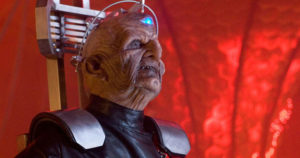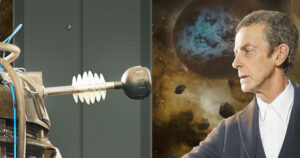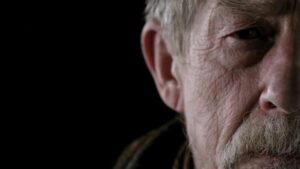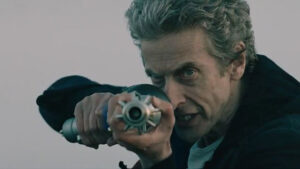The Moral Evolution of the Doctor
Mark McCullough explores how the Doctor has changed morally across the revival.

I never thought I’d see the day where Doctor Who ended a series opener on a cliff-hanger featuring a main protagonist aiming a weapon at a defenceless child, well not for a second time anyway! It would be foolish to overlook the similarities between how The Impossible Astronaut and The Magician’s Apprentice when they do in fact pose the exact same moral dilemma. In truth however they are vastly different: Amy finds herself encountering the astronaut by chance, in a situation in which her life is in danger, with no real knowledge of the true nature of the astronaut. With the Doctor however, it is implied that he used the knowledge of a point where Davros was vulnerable and exploited it. Of course, we don’t know if he has actually pulled the trigger yet. Regardless of the outcome I can easily say that the scene represented the biggest cliff-hanger we have ever had. The most simple reason why: its scale, and I don’t just mean within the episode.
“You would make a good Dalek.” – Dalek (2005)
Right back when the Daleks were first introduced to the revived series we saw a side to the Doctor that was different to anything we had experienced before. Dalek will always be one of my favourite episodes, and the scene from which the quote above comes from would definitely be up there in my list of all-time favourite moments from the show. The Doctor’s explosion of anger at the Dalek is greeted with the retort that the Time Lord himself would make a good Dalek. And thus a seed is planted within the show.
“Removing the emotions makes you stronger. That’s what your creator thought, all those years ago. “”He was wrong.”- Evolution of the Daleks (2007)
 You may think I have just lumped this in here because it fits nicely with what Davros taunted the Doctor with in the final moments of The Magician’s Apprentice. That’s not strictly the reason why I did, in terms of a full picture it made sense to reference this episode too because it is the exact foil of what has just occurred in the latest episode. (It’s also where I got the title of this article from). The main reason Helen Raynor’s excellent two parter is included is because it introduced the idea of a change within the nature of a Dalek, something which is later revisited in Into the Dalek.
You may think I have just lumped this in here because it fits nicely with what Davros taunted the Doctor with in the final moments of The Magician’s Apprentice. That’s not strictly the reason why I did, in terms of a full picture it made sense to reference this episode too because it is the exact foil of what has just occurred in the latest episode. (It’s also where I got the title of this article from). The main reason Helen Raynor’s excellent two parter is included is because it introduced the idea of a change within the nature of a Dalek, something which is later revisited in Into the Dalek.
“The Doctor. The man who keeps running, never looking back because he dare not, out of shame. This is my final victory, Doctor. I have shown you yourself.” – Journey’s End (2009)
 Another Russell T Davies era episode that is made better retrospectively by Moffat’s brilliant cliff-hanger on Saturday night. Although it has to be said the concept of The Magician’s Apprentice can essentially be summed up by this line from none other than Davros himself, six years ago. The difference, when this was said, the Doctor was at Davros mercy while Davros was essentially at the peak of his powers. This time out the Doctor willingly comes to a dying Davros, yet the creator of the Daleks is still able to enact the same victory over him, highlighting the Doctor’s shame, but not stopping there.
Another Russell T Davies era episode that is made better retrospectively by Moffat’s brilliant cliff-hanger on Saturday night. Although it has to be said the concept of The Magician’s Apprentice can essentially be summed up by this line from none other than Davros himself, six years ago. The difference, when this was said, the Doctor was at Davros mercy while Davros was essentially at the peak of his powers. This time out the Doctor willingly comes to a dying Davros, yet the creator of the Daleks is still able to enact the same victory over him, highlighting the Doctor’s shame, but not stopping there.
“Do you know how you make someone into a Dalek? Subtract love, add anger.” – Asylum of the Daleks (2012)
 Obviously this is where I can go into a bit more detail about Moffat’s cliff-hanger and how long he has been building it for as I am now into Moffat written material. Asylum of the Daleks introduces the concept of converting someone into a Dalek, in more than one way. Initially we have the nanocloud which converts non-Dalek organism to the Dalek mind-set without physically changing them, we see this demonstrated with Amy. Oswin Oswald on the other hand receives the short stick and has her body converted to Dalek form, but it able to resist mental conversion and retains her personality.
Obviously this is where I can go into a bit more detail about Moffat’s cliff-hanger and how long he has been building it for as I am now into Moffat written material. Asylum of the Daleks introduces the concept of converting someone into a Dalek, in more than one way. Initially we have the nanocloud which converts non-Dalek organism to the Dalek mind-set without physically changing them, we see this demonstrated with Amy. Oswin Oswald on the other hand receives the short stick and has her body converted to Dalek form, but it able to resist mental conversion and retains her personality.
So what does this tell us? It’s not actually the Dalek form that makes someone Dalek, it is the mind-set they possess. This is hardly a surprise given that the monsters are modelled on the Nazi ideal. However it does add cadence to the fact there are implications of how the Doctor would make a good Dalek. The line above is of particular interest when viewed in relation to Davros’ request that the Doctor admits that compassion is a weakness. By killing his companion he has removed all love from the Doctor’s life and added anger at their loss.
“I am not a good Dalek. You are a good Dalek.” – Into the Dalek (2014)
 Another episode which is part penned by Moffat himself, and here we have the seed that was planted in Dalek come to fruition as the concept of a good Dalek is explored in more detail. Obviously what the narrative refers to as ‘good’ is the physical Dalek, with a consciousness that is not Dalek, akin to what we had with Dalek Sec, except pure Dalek DNA. The addition of Rusty to the Doctor Who universe was always going to be one which had lots of implications further down the line, not least when viewed with some of the other recent revelations. So now it’s time to break our nice chronology as we try to further contextualise the cliff-hanger:
Another episode which is part penned by Moffat himself, and here we have the seed that was planted in Dalek come to fruition as the concept of a good Dalek is explored in more detail. Obviously what the narrative refers to as ‘good’ is the physical Dalek, with a consciousness that is not Dalek, akin to what we had with Dalek Sec, except pure Dalek DNA. The addition of Rusty to the Doctor Who universe was always going to be one which had lots of implications further down the line, not least when viewed with some of the other recent revelations. So now it’s time to break our nice chronology as we try to further contextualise the cliff-hanger:
“Yes, I’m a Time Lord, but I’m one of the nice ones.” “Get away from me!” “Well, look on the bright side. I’m not a Dalek.” “Who can tell the difference anymore?” – The Night of the Doctor (2013)
 Famous for the return of Paul McGann’s Eighth Doctor and finally giving us his regeneration scene, The Night of the Doctor is widely regarded as a perfect piece of Doctor Who. And deservedly so! But in the context of today’s discussion it adds more than that. It established the groundwork that Time Lords and Daleks are viewed as similar by the outside members of the universe. Now if you recall a few paragraphs ago I mentioned that it is the mind-set which makes something Dalek and not the external Dalek casing, then we have a situation where the Time Lords essentially are made into Daleks by the Time War. This fits perfectly with Rassilon’s desire to exterminate all other life in the universe and ascend as supreme beings. So good Time Lords and Good Daleks for the eyes of many in the universe may well be the same thing. Go what makes the Doctor good?
Famous for the return of Paul McGann’s Eighth Doctor and finally giving us his regeneration scene, The Night of the Doctor is widely regarded as a perfect piece of Doctor Who. And deservedly so! But in the context of today’s discussion it adds more than that. It established the groundwork that Time Lords and Daleks are viewed as similar by the outside members of the universe. Now if you recall a few paragraphs ago I mentioned that it is the mind-set which makes something Dalek and not the external Dalek casing, then we have a situation where the Time Lords essentially are made into Daleks by the Time War. This fits perfectly with Rassilon’s desire to exterminate all other life in the universe and ascend as supreme beings. So good Time Lords and Good Daleks for the eyes of many in the universe may well be the same thing. Go what makes the Doctor good?
“Never cruel or cowardly, never give up, never give in!” – The Day of the Doctor (2013)
 The Doctor’s promise is what sets him apart from the rest of his species. He has a greater capacity to understand and appreciate the rest of the universe. As such he is dismissed as insane by his own people. Interestingly enough I see a lot of parallels between the Doctor and the Dalek Sec Hybrid, both see the truth of what their species is, both recognise admirable qualities in what the universe in general would deem as a lesser species, and both face decision which impact the future of their species. This is where they diverge slightly, Sec decides to change the future of his species by removing what he deems their weaknesses, the Doctor however opts to save his species and let them continue to wreck terror on the universe. His reason for doing this is because he believes it to be morally right and thinks he can save his own people (even though the biggest risk to them, is themselves.)
The Doctor’s promise is what sets him apart from the rest of his species. He has a greater capacity to understand and appreciate the rest of the universe. As such he is dismissed as insane by his own people. Interestingly enough I see a lot of parallels between the Doctor and the Dalek Sec Hybrid, both see the truth of what their species is, both recognise admirable qualities in what the universe in general would deem as a lesser species, and both face decision which impact the future of their species. This is where they diverge slightly, Sec decides to change the future of his species by removing what he deems their weaknesses, the Doctor however opts to save his species and let them continue to wreck terror on the universe. His reason for doing this is because he believes it to be morally right and thinks he can save his own people (even though the biggest risk to them, is themselves.)
“Am I a good man?” – Series 8 (2014)
 The question underpinned the entire Eighth Series of the revived Doctor Who. The Doctor we were presented with was ultimately less compassionate, angrier and a considerable amount more ruthless than his previous incarnations, essentially more Dalek. What is key however is that he still makes the decisions that the Doctor would normally make, even if sometimes that has to be under Clara’s guidance. Last year I wrote an article about why the Doctor hated soldiers so much, In this I attributed it to the events of The Time of the Doctor and his war with the Daleks. Perhaps there’s more to it though, perhaps he sees soldiers as a reflection of the Dalek in himself, and he doesn’t like it.
The question underpinned the entire Eighth Series of the revived Doctor Who. The Doctor we were presented with was ultimately less compassionate, angrier and a considerable amount more ruthless than his previous incarnations, essentially more Dalek. What is key however is that he still makes the decisions that the Doctor would normally make, even if sometimes that has to be under Clara’s guidance. Last year I wrote an article about why the Doctor hated soldiers so much, In this I attributed it to the events of The Time of the Doctor and his war with the Daleks. Perhaps there’s more to it though, perhaps he sees soldiers as a reflection of the Dalek in himself, and he doesn’t like it.
“”Exterminate!” – The Doctor” – The Magician’s Apprentice (2015)
 To conclude the article we come to the cliff-hanger itself and it is worth noting that Moffat chose to have the Doctor utter the words of his most famous enemy. This is why the climax transcends a single episode, it draws the arc to a point where a choice has to be made. Could Davros be about to create the most dangerous of all Daleks, one capable of becoming a god? Or will the Doctor do what he does best and save the day, reversing his friends deaths? Doctor or Dalek, which side will our protagonist fall? I hope we find out on Saturday otherwise this will have been a rather pointless endeavour.
To conclude the article we come to the cliff-hanger itself and it is worth noting that Moffat chose to have the Doctor utter the words of his most famous enemy. This is why the climax transcends a single episode, it draws the arc to a point where a choice has to be made. Could Davros be about to create the most dangerous of all Daleks, one capable of becoming a god? Or will the Doctor do what he does best and save the day, reversing his friends deaths? Doctor or Dalek, which side will our protagonist fall? I hope we find out on Saturday otherwise this will have been a rather pointless endeavour.








